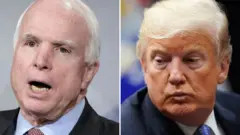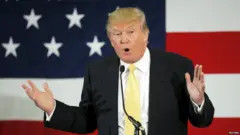 John McCain and Donald Trump in a tense exchange
John McCain and Donald Trump in a tense exchange
The contentious relationship between John McCain and Donald Trump was a defining feature of modern American politics, marked by public spats and deep ideological divides, even as they belonged to the same Republican party. This rivalry, intensifying from Trump’s initial presidential campaign through his term in office, showcased fundamental disagreements on policy, values, and the very nature of American leadership. From questioning McCain’s war hero status to dramatic political showdowns, their conflict provides a crucial lens for understanding the fractures within the Republican party and the broader political landscape of the United States.
Here are five pivotal moments that underscore the sharp and often personal feud between John McCain and Donald Trump.
1. “Firing Up the Crazies”: McCain’s Early Criticism of Trump’s Rhetoric
Donald Trump’s entry into the 2016 presidential race was characterized by inflammatory rhetoric, most notably his controversial remarks about Mexican immigrants in the summer of 2015. Announcing his candidacy, Trump asserted, “They’re bringing drugs, they’re bringing crime, they’re rapists, and some, I assume, are good people.” These statements, delivered with characteristic bombast, immediately drew widespread condemnation and set the stage for his divisive campaign.
 Donald Trump announcing his presidential campaign in 2015
Donald Trump announcing his presidential campaign in 2015
Adding fuel to the fire, Trump also introduced his signature campaign promise: building a wall along the US-Mexico border. John McCain, a respected figure within the Republican party, swiftly responded to Trump’s pronouncements. The Arizona senator publicly denounced Trump’s attacks on immigrants, accusing him of “firing up the crazies” with his divisive and xenophobic views. This early rebuke from McCain signaled the beginning of a significant intra-party conflict and highlighted the deep unease many Republicans felt towards the ascendant Trump.
2. “Not a War Hero”: Trump’s Disrespectful Attack on McCain’s Service
While McCain was the first to publicly criticize Trump’s rhetoric, Trump’s response was swift and deeply personal. Less than a month after Trump’s controversial comments on Mexican immigrants, he targeted McCain directly, questioning his war hero status during a campaign event in Iowa. “He’s a war hero because he was captured,” Trump stated dismissively. “I like people that weren’t captured.”
 John McCain as a prisoner of war in Vietnam
John McCain as a prisoner of war in Vietnam
These remarks were particularly offensive given McCain’s distinguished military service and the immense suffering he endured as a prisoner of war in Vietnam. Shot down in 1967, McCain was held captive for five and a half years, enduring torture and refusing early release offers that would have meant abandoning his fellow prisoners. Trump’s rivals for the Republican nomination condemned his attack, and while Trump eventually walked back his comments slightly, he never issued a direct apology to McCain. McCain, for his part, deflected calls for a personal apology, instead suggesting Trump apologize to “the families of those who have sacrificed in conflict.” Years later, McCain subtly alluded to Trump’s draft deferments during the Vietnam War, criticizing those who avoided service through medical exemptions like “bone spurs,” a condition Trump cited to avoid military service.
3. “No Excuses”: McCain Withdraws Support After Access Hollywood Tape
Despite their personal animosity, McCain, as a Republican party loyalist, initially supported Trump after he secured the presidential nomination. However, this conditional support fractured dramatically in October 2016, just weeks before the presidential election. The release of the infamous “Access Hollywood” tape, in which Trump boasted in graphic and obscene terms about groping and kissing women without their consent, proved to be a breaking point.
McCain swiftly and unequivocally withdrew his endorsement of Trump. He declared that Trump’s behavior made it “impossible to continue to offer even conditional support for his candidacy,” stating firmly, “Donald Trump’s behavior makes it impossible to continue to offer even conditional support for his candidacy. There are no excuses for Donald Trump’s offensive and demeaning comments. No woman should ever be victimized by this kind of inappropriate behavior. He alone bears the burden of his conduct and should suffer the consequences.” This move was a significant public rebuke and highlighted the moral chasm McCain perceived between himself and Trump.
4. The Obamacare Vote: McCain’s Thumbs Down Defiance
The feud between McCain and Trump escalated further once Trump assumed the presidency and began pursuing his policy agenda. A central campaign promise of Trump’s was the repeal and replacement of the Affordable Care Act (ACA), also known as Obamacare, President Obama’s landmark healthcare legislation. Republicans launched numerous attempts to dismantle the ACA, and in the summer of 2017, they appeared on the verge of success, needing just 50 votes in the Senate, where they held a slim 52-48 majority.
 John McCain's dramatic vote against Obamacare repeal
John McCain's dramatic vote against Obamacare repeal
In a dramatic and decisive moment, John McCain, battling brain cancer at the time, cast a resounding “no” vote, effectively killing the Republican effort to repeal Obamacare. McCain’s vote was a stunning act of defiance against his own party and a direct blow to President Trump’s agenda. Trump publicly condemned Republicans who did not support the repeal, pointedly stating, “They don’t have the guts to vote for it.” McCain’s vote was seen by many as a principled stand, driven by his belief in bipartisan governance and his opposition to the partisan approach to healthcare reform championed by Trump.
5. Condemning Autocrats: McCain’s Foreign Policy Clashes with Trump’s
John McCain was a leading Republican voice on foreign policy, advocating for a robust American role in global affairs and a strong stance against authoritarian regimes. This perspective clashed sharply with President Trump’s foreign policy inclinations, particularly Trump’s frequent expressions of admiration for Russian President Vladimir Putin.
When Putin secured re-election in March 2018, McCain issued a scathing statement criticizing Trump for congratulating the Russian leader. “An American president does not lead the Free World by congratulating dictators on winning sham elections,” McCain declared. His criticism intensified following the Helsinki summit between Trump and Putin in July 2018. During the summit, Trump publicly sided with Putin over the assessment of US intelligence agencies regarding Russian interference in the 2016 election. McCain condemned the Helsinki summit as “one of the most disgraceful performances by an American president in memory.” He further elaborated, “The damage inflicted by President Trump’s naivete, egotism, false equivalence, and sympathy for autocrats is difficult to calculate, but it is clear that the summit in Helsinki was a tragic mistake.” McCain’s staunch opposition to Trump’s foreign policy, particularly his conciliatory approach to Russia, underscored the fundamental differences in their understanding of American leadership and global responsibility.
The clashes between John McCain and Donald Trump transcended mere political disagreements. They represented a fundamental clash of values, ideologies, and visions for the Republican party and the United States. Their bitter rivalry remains a significant chapter in American political history, highlighting the deep divisions within contemporary conservatism and the evolving nature of American political discourse.
